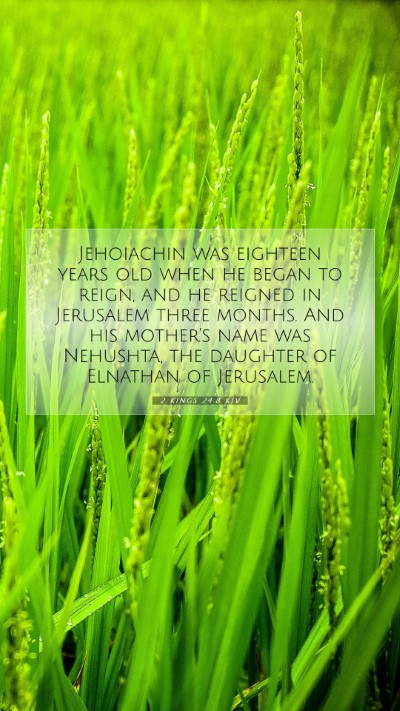Old Testament
Genesis Exodus Leviticus Numbers Deuteronomy Joshua Judges Ruth 1 Samuel 2 Samuel 1 Kings 2 Kings 1 Chronicles 2 Chronicles Ezra Nehemiah Esther Job Psalms Proverbs Ecclesiastes Song of Solomon Isaiah Jeremiah Lamentations Ezekiel Daniel Hosea Joel Amos Obadiah Jonah Micah Nahum Habakkuk Zephaniah Haggai Zechariah Malachi2 Kings 24:8 Meaning
What is the meaning of 2 Kings 24:8?
Jehoiachin was eighteen years old when he began to reign, and he reigned in Jerusalem three months. And his mother's name was Nehushta, the daughter of Elnathan of Jerusalem.
2 Kings 24:8 Bible Verse Meaning
Bible Verse Commentary: 2 Kings 24:8
Verse: 2 Kings 24:8 - "Jehoiachin was eighteen years old when he became king, and he reigned in Jerusalem three months. His mother's name was Nehushta daughter of Elnathan; she was from Jerusalem."
This verse serves as an introduction to King Jehoiachin, laying the groundwork for understanding the historical and spiritual context of his reign. The verse is rich in implications that emerge when examined through the lenses of various public domain commentaries, including those of Matthew Henry, Adam Clarke, and Albert Barnes.
Contextual Analysis
The reign of Jehoiachin comes at a critical moment in Jewish history—the Babylonian exile. This passage signifies the decline of the Davidic line of kings and sets the stage for the impending judgment upon Jerusalem.
Matthew Henry's Commentary
Matthew Henry highlights the brevity of Jehoiachin's reign, noting that being only eighteen years old and reigning for just three months suggests a lack of preparedness and stability in leadership. Henry emphasizes that Jehoiachin's youth may have played a role in his ineffectiveness as a king, drawing attention to the significance of wisdom and experience in leadership positions.
Albert Barnes' Insights
Albert Barnes offers a practical interpretation by discussing the historical context leading up to Jehoiachin's appointment. He suggests that Jehoiachin's installation as king was influenced by external pressures from Babylon and internal strife within Judah. Barnes implies that Jehoiachin's short reign reflects the turbulent nature of the times, linking it to the prophecy of impending disaster foretold by prophets like Jeremiah.
Adam Clarke's Exegesis
Adam Clarke provides an in-depth look at Jehoiachin's family background, pointing out that his mother Nehushta may have had a role in shaping his character and decisions. Clarke delves into the implications of Jehoiachin's lineage, suggesting that the influence of his upbringing played a pivotal role in his governance. Additionally, Clarke mentions the significance of age and wisdom as crucial elements for effective leadership, drawing parallels to the qualities displayed by previous kings.
Thematic Significance
This verse provides multiple themes essential for deep Bible study and comprehension:
- Youth and Leadership: It probes the yoga of youth in leadership roles, particularly in times of crisis.
- Historical Context: The significance of Jehoiachin's reign is not just in his lineage but also in the broader narrative of Judaic history.
- Prophetic Fulfillment: This moment in history links back to prophecies concerning the fate of Jerusalem and Israel.
Cross References
This verse relates to several other Scripture passages that can enhance the understanding of Jehoiachin's reign:
- 2 Kings 23:34 - The appointment of Jehoiachin’s father, Jehoiakim.
- 2 Chronicles 36:8 - Further insights on Jehoiachin’s character and reign.
- Jeremiah 22:24-30 - Prophetic declarations about the fate of Jehoiachin and his lineage.
Application and Reflection
When studying this verse, consider the implications it has for contemporary leadership:
- Understanding Youth Leadership: Reflect on how the qualities of youth can be both a strength and a vulnerability in leadership roles.
- Lessons from History: Examine how historical contexts influence present-day governance and societal stability.
- Faithfulness in Leadership: Analyze how faith and spiritual integrity can impact leadership effectiveness.
Conclusion
In conclusion, 2 Kings 24:8 offers a succinct yet profound glimpse into the transitional phase of Jewish leadership. The combined insights from various public domain commentaries illuminate the broader implications of kingly authority, the significance of upbringing, and the contextual pressures of the times. Engaging with this verse can deepen our Bible verse understanding and enrich our Bible study resources.


